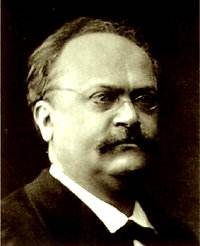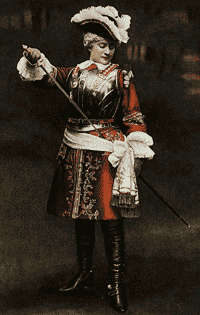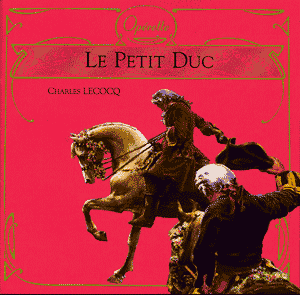
Ready to discover something fresh and appealing? In Le Petit
Duc we have a charming operetta (an opéra-bouffe, in
fact) which is in some ways better than Lecocq's more familiar,
La Fille de Madame Angot. Until now no recording was to be
found in the catalogue and so we should welcome this re-release.
The operetta contains good music, humorous activity and provides
a spectacle full of colour and interest with horses coming and
going. A good book had been provided by Meilhac and Halévy
(who had previously written libretti for Offenbach). Traubner
suggests that the piece foreshadows Messager.
Charles Lecocq was born in Paris of poor
parents in 1832. It is much to his credit that with his love for
music he was able to get into the Paris Conservatoire. There he
was a contemporary of Bizet and Saint-Saëns and studied under
Auber. With Bizet he went on to win an Offenbach operetta writing
competition (1856). He loved the creative potential of the theatre
and became involved with it for the rest of his life. Writing
over forty operettas it is surprising that self-criticism prevented
him from realising more ambitious ideas. His one opera, Plutus
(1886), was apparently a failure. With Le Petit Duc
however, Lecocq put much energy into the score and the result
is a bouquet of excellent ideas, catchy themes and delightful
orchestration. The overture starts in a disjointed fashion with
drum rolls and chords before breaking into one of the favourite
melodies of the work. From then on the overture gathers in interest.
The most celebrated numbers in the piece are the Act I duet, C'est
pourtant bien doux [CD1 tk.8], the Act III Duke's song Pas
de femme! [CD2 tk.10] and the duet, Te souvient-il [tk.11].
The book tells the tale of an aristocratic marriage,
set in Versailles and of two lovers whom their parents think are
too young to marry and engage in sex. The little Duke and his
Duchess are determined in their intention and sing some of the
nicest songs ever penned by Lecocq. The 'hot' book had to be watered
down before offering The Little Duke to the British public.
Stage performances have worked the best when
the Duke and Duchess are played by youthful singers who can come
across as sincere in their juvenile flirtations. They are both
excellent singers but this is my only reservation about the lead
singers. It is true that Elaine Thibault has an innocence about
her light soprano voice, but in some numbers she had a veiled
timbre, giving the impression she was singing through a muted
microphone. André Joblin's appealing tenor was elegant
but in my opinion rather too mature for the part. The contrasting
voices of Claude Cales (a light tenor) and Jean Giraudeau (a sonorous
bass) work extremely well together in their Act I duet. Giraudeau
also provides plenty of colour in the Act II duet with the Duke.
The recording is a most agreeable one with optimum
miking, clarity and good balance. Although Grassi's pace is initially
pedantic he gathers momentum and the score blossoms. A slow reading
of a sedate opening chorus is probably intended to convey an air
of stately pomp and majesty, but for me the pace of this number
doesn't appeal.
Brief notes in French are provided in an attractively
produced card case.
Raymond Walker
Operette
series from Universal Accord reviewed
by Ray Walker

Lead part, from Ganzl.


